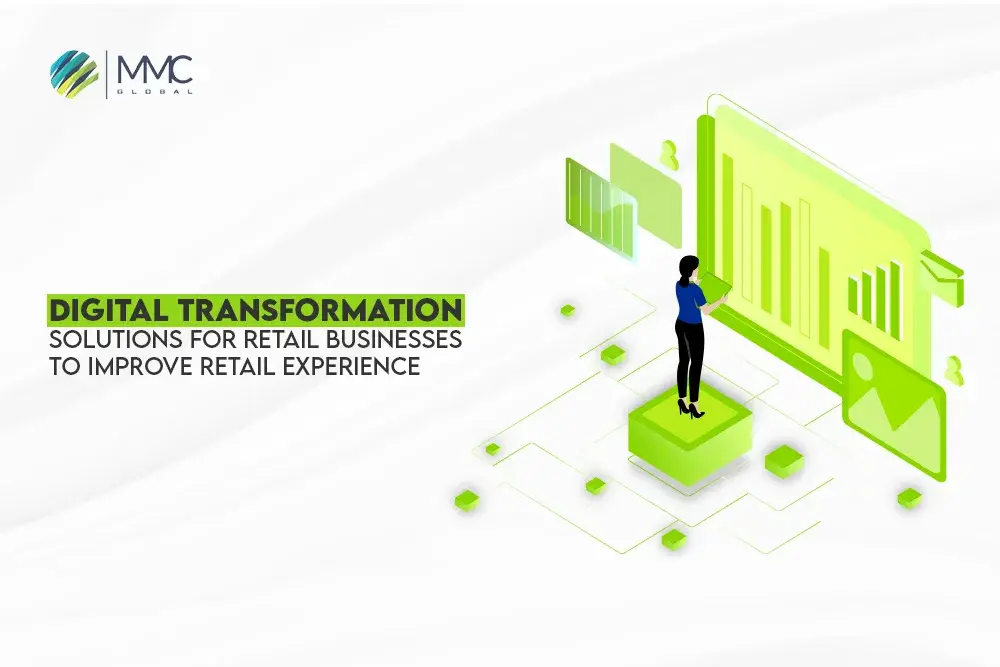Digital Transformation Solutions For Retail Businesses To Improve Retail Experience


In today’s competitive landscape, retail businesses are constantly seeking innovative strategies to stay ahead. One such strategy that has been gaining momentum ever since before is implementing digital transformation solutions. This seismic shift in the retail industry is not merely a trend but a necessity for survival and growth.
Retail businesses are highly competitive in the market. However, to improve its operation and workflows, digital transformation is a crucial key driver for maximizing ROI and expanding lucrative opportunities. In fact, an effective digital transformation strategy is a must to implement digitization. You can hire a trusted digital transformation company that has experienced IT consultants who can suggest and execute effective digital transformation strategies that align with your business objectives.
Substantially, MMC Global is the US top-rated IT consultant and digital transformation company that pushed many startup businesses into well-established corporations. Furthermore, their commitment to excellence makes them a trusted partner of businesses that want to thrive in this cutting-throat era. Let’s see how our experiences reflect the digital transformation in retail businesses.
What Are Digital Transformation Solutions?
Digital transformation solutions are the type of software and applications that are built with digital technologies to implement into all aspects of a business. However, this integration of digital transformation solutions fundamentally alters its operations and customer value delivery. It involves leveraging digital tools and platforms to enhance efficiency, improve customer experience, and foster innovation across functions such as marketing, sales, operations, and customer service.
Instead of merely adopting new technologies, digital transformation requires rethinking business processes, organizational culture, and customer engagement strategies. This adaptation is essential to thrive in the digital age and remain competitive in today’s rapidly evolving landscape.
Understanding Digital Transformation Solutions in Retail
Digital transformation in retail refers to the integration of digital technologies to fundamentally change the way businesses operate and deliver value to customers. Moreover, it encompasses a wide range of initiatives, including adopting e-commerce platforms, implementing data analytics, leveraging artificial intelligence, as well as enhancing the omnichannel experience.

Key components to implement digital transformation Solutions
Strategic Vision and Leadership
A clear strategic vision from top leadership is essential for driving digital transformation initiatives. Leaders must champion change, set clear objectives, and allocate resources effectively to ensure the success of transformation efforts.
Customer-Centric Approach
Digital transformation solutions should deliver a deep understanding of customer needs and preferences. Moreover, retailers must prioritize the delivery of personalized and seamless experiences across all touchpoints to enhance customer satisfaction and loyalty.
Technology Infrastructure
Building a robust technology infrastructure is critical for supporting the initiative of digital transformation solutions. This includes investing in scalable and flexible platforms for e-commerce, data analytics, artificial intelligence, as well as omnichannel integration to enable seamless operations and innovation.
Data Strategy and Analytics
Data is the fuel that powers digital transformation solutions. Retailers must develop a comprehensive data strategy to collect, analyze, and leverage customer and operational data effectively. Advanced analytics tools and techniques enable retailers to gain actionable insights and make data-driven decisions.
Agile Processes and Culture
Agile methodologies and a culture of experimentation are essential for adapting to rapidly changing market conditions. In addition, retailers should embrace agile principles to iterate quickly, test new ideas, and respond to customer feedback promptly.
Talent and Skills Development
Building a workforce with the necessary digital skills and expertise is crucial for integrating digital transformation solutions. In fact, retailers should invest in training and upskilling employees to ensure they have the knowledge and capabilities to leverage digital technologies effectively.
Partnerships and Ecosystem Collaboration
Collaborating with external partners, including technology vendors, startups, and industry experts, can accelerate digital transformation efforts. Retailers should seek strategic partnerships to access innovative solutions, expertise, and resources that complement their internal capabilities.
Change Management and Communication
Effective change management and communication are essential for gaining buy-in from stakeholders and ensuring the successful implementation of digital transformation initiatives. Retailers should communicate transparently, involve employees in the process, and address any concerns or resistance proactively.
Get More Info: Digital Transformation Solutions: Initial Steps Before Implementing
Why To Adopt Digital Transformation Solutions In Retail Businesses
Enhancing Customer Experience through E-Commerce Platforms
E-commerce platforms have become indispensable for retail businesses, providing a convenient and accessible way for customers to browse and purchase products. By investing in robust e-commerce solutions, retailers can reach a wider audience, offer personalized recommendations, and streamline the checkout process, ultimately enhancing the overall customer experience.
Harnessing the Power of Data Analytics
Data is the new currency in the digital age, and retail businesses are leveraging advanced analytics tools to gain actionable insights into consumer behavior, preferences, as well as trends. By analyzing vast amounts of data, retailers further can make informed decisions regarding inventory management, pricing strategies, and marketing campaigns. As a result, it leads to increased efficiency and profitability.
Embracing Artificial Intelligence for Personalization
Artificial intelligence (AI) revolutionizes the retail landscape by enabling personalized shopping experiences tailored to individual preferences. AI-powered chatbots assist customers with product recommendations and real-time inquiries, while machine learning algorithms analyze past purchase history to predict future buying behavior. This allows retailers to offer targeted promotions and recommendations, enhancing customer satisfaction and loyalty.
Optimizing the Omnichannel Experience
In today’s omnichannel world, consumers expect a seamless shopping experience across multiple touchpoints. For example, it can be physical stores, websites, mobile apps, and social media platforms. Retailers must integrate these channels to provide a cohesive and consistent experience. It allows customers to browse, purchase, and interact with the brand seamlessly regardless of the platform they choose.
Some Major Digital Transformations in the Retail Industry
Mobile Point-of-Sale (mPOS) Systems
Retailers are integrating mPOS systems to streamline checkout processes and enhance customer convenience. With mPOS, sales associates can assist customers anywhere in the store, reducing wait times and improving overall satisfaction.
Beacon Technology for Personalized Marketing
Beacon technology allows retailers to send personalized promotions and recommendations to customers’ smartphones based on their location within the store. By leveraging beacon technology, retailers can enhance engagement and drive sales through targeted marketing efforts.
Virtual Reality (VR) for Enhancing Shopping Experiences
Retailers are embracing VR technology to create immersive shopping experiences for customers. Through VR, shoppers can virtually explore products, visualize home décor items in their living spaces, and even try on clothing without physically being in the store, thereby enhancing the online shopping experience.
Integrating Chatbots for Customer Support
Retailers are incorporating chatbots into their websites and mobile apps to provide instant customer support. Chatbots can assist customers with product inquiries, order tracking, and troubleshooting, offering round-the-clock assistance and improving overall satisfaction.
Predictive Analytics for Demand Forecasting
Implementing digital transformation solutions that empower data analytics is such a strengthening strategy for retailers. Retailers leverage predictive analytics to forecast demand more accurately and optimize inventory management. By analyzing historical sales data, market trends, and seasonal fluctuations, retailers can anticipate customer demand and ensure adequate stock levels. As a result, it minimizes stockouts and maximizes sales opportunities.
RFID Technology for Inventory Management
RFID technology enables retailers to track inventory in real-time, reducing stock discrepancies and improving inventory accuracy. By tagging products with RFID tags, retailers can monitor stock levels, track item movement throughout the supply chain, and quickly locate misplaced or stolen items, thereby streamlining operations and reducing costs.
Offering Contactless Payment Options
With the rise of Digital Transformation solutions, contactless payment methods such as mobile wallets and NFC-enabled cards are promising technologies that everyone is experiencing. Retailers can provide customers with secure and convenient payment options. By accepting contactless payments, retailers can speed up transactions, enhance customer satisfaction, and adapt to changing consumer preferences for cashless transactions.
The Bottom Line: Embracing Change for Success
In conclusion, digital transformation solutions are revolutionizing the retail industry by empowering businesses to adapt to evolving consumer preferences, streamline operations, and drive growth. By embracing e-commerce platforms, data analytics, artificial intelligence, and omnichannel strategies, retailers can stay competitive in an increasingly digital world and deliver unparalleled value to their customers. Embracing change is no longer an option but a necessity for success in today’s fast-paced retail landscape.



